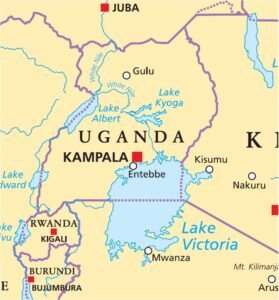Uganda has emerged as a formidable oil and gas competitor. With sizeable reserves, enabling regulation, and a proactive national oil company that prioritizes local participation, inclusivity, and capacity building, the country is positioning itself as a force to be reckoned with. The African Energy Week (AEW) 2021 in Cape Town (9th-12th of November 2021) will drive this narrative.
By Lucien Joppen – Based upon content organisation AEW
Despite representing a relatively new hydrocarbon sector, Uganda – with its 6.5 billion barrels of proven crude oil reserves and 0.5 trillion cubic feet of natural gas – has made significant prog-ress in establishing a competitive oil and gas industry.
Under its current government, the Ugandan national oil company (UNOC) has accelerated hydrocarbon exploration, large-scale project developments, and regional synergies, driving widespread socio-economic growth in the process.
Uganda boasts participation by some of the world’s leading international oil companies. Since 2004, Tullow Oil has played a pivotal role in developing Uganda’s oil and gas sector, with significant discoveries made in the Lake Albert Rift Basin in 2006 and 2009. Similarly, Heri-tage Oil Plc. has been a major contributor of Uganda’s industry success through discoveries such as the 600-million-barrel drilling campaign in the Albert Basin and the Kingfisher Well in 2008. Both companies have been instrumental in opening up several basins in the country, ac-celerating associated developments and establishing a competitive sector. In 2020, Tullow sold its assets to Total, which, in collaboration with China’s CNOOC, has been driving growth across the entire value chain.
Boosting investment
Although the participation of IOCs have been valuable in expanding Uganda’s sector, it is the active participation of the UNOC that has positioned the country as a regional competitor. Notably, UNOC, whose overall function is to manage the government’s commercial interests in the petroleum sector and ensure resources are exploited in a sustainable manner, has played a significant role in driving progress. Even throughout the COVID-19 pandemic, whereby price and operational impacts hin-dered progress, the UNOC has not only managed to sustain operations, but excel.
Under the guidance of its CEO, Mr. Nabbanja, UNOC has overseen a range of projects across the entire energy value chain. In the upstream sector, notable projects include the 40,000 barrel per day (bpd) Kingfisher Project; the 190,000 bpd Tilenga Project; as well as the exploration of new ventures in the country’s second licens-ing round. In the midstream sector, projects include the Kabaale Industrial Park – comprising the country’s second international airport, a crude oil export hub, and the Uganda refinery the 60,000 bpd Uganda Refinery Project; and the monumental 1,443km, 216,000 bpd East Africa Crude Oil Pipeline (EACOP), connecting Kabaale-Hoima in Uganda with the Chongoleani peninsula near Tanga port in Tanzania.
Finally, downstream projects include downstream petroleum trading; the Jinja Storage Terminal; and the Kampala Storage Terminal – which will serve as regional pipeline hub. By showcasing these projects to global stakeholders in Cape Town,AEW 2021 is committed to boosting investment in Uganda’s burgeoning sector.
Top priority

“AEW 2021 has placed Uganda as a top priority in Cape Town”, states NJ Ayuk,
Executive Chairman of the AEC. “The country’s significant resources, political will, and active local business sector will position the country as a regional leader, warranting an increase in foreign investment and associated developments. Projects, such as the EACOP, represent fundamental opportunities for both local and regional companies, and opens up the region for petroleum investment through the establishment of a viable export route. AEW 2021 will showcase Uganda, its enabling environment, and its incredible leadership, driving dealmaking and partnerships in the process.”
“Meanwhile, in addition to playing an active role in the sector, UNOC and the Ministry have placed a focus on domestic capacity building through the emphasis of female inclusivity, local company participation, and the transfer of skills from IOCs to local companies. Projects, such as EACOP, present the unique opportunity for local companies to actively participate in the country’s oil and gas sector, not just as commission agents, but as active participants. By seizing the opportunities brought about by the EACOP, and target-ing partnerships and joint-ventures with regional actors, local companies will be enablers of a successful oil and gas industry in Uganda.”
“Historic Milestone”
 In April 2021, Total’s CEO Patrick Pouyanne was among those who signed deals, according to a broadcast of the ceremony attended by Ugandan President Yoweri Museveni and Tanzanian President Samia Suluhu Hassan. The agreements faced multiple delays since the first commercial discoveries of oil were made 15 years ago. China’s biggest O&G-producer, CNOOC Ltd., and Uganda National Oil Co. are also partners who participated.
In April 2021, Total’s CEO Patrick Pouyanne was among those who signed deals, according to a broadcast of the ceremony attended by Ugandan President Yoweri Museveni and Tanzanian President Samia Suluhu Hassan. The agreements faced multiple delays since the first commercial discoveries of oil were made 15 years ago. China’s biggest O&G-producer, CNOOC Ltd., and Uganda National Oil Co. are also partners who participated.
Mr. Pouyanne (see image right) called the signing a “historic milestone” for the production work and export pipeline that will draw more than $10 billion of investment. “It’s a very large development, one of the largest that will be developed on this continent”. First oil is expected in 2025.
The aforementioned partners will develop the Tilenga and Kingfisher discoveries near Lake Albert, as well as a 1,443-kilometer (897-mile) heated pipeline to transport Uganda’s waxy crude for export at the port of Tanga in Tanzania. The French explorer holds 57 per cent of the oil field licenses and a large stake in the pipeline project.
Source: Worldoil.com
About this Featured Story
This Featured Story is an article from our Valve World Magazine September 2021 issue. To read other featured stories and many more articles, subscribe to our print magazine.
“Every week we share a new Featured Story with our Valve World community. Join us and let’s share your Featured Story on Valve World online and in print.”


